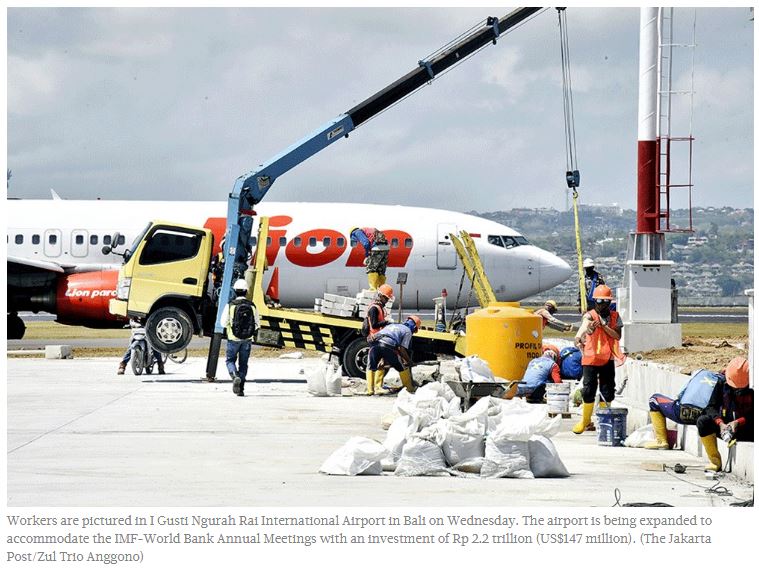Indonesia tells Fed to be more aware of emerging economy impact
Indonesia has a blunt message for the U.S. Federal Reserve’s Jerome Powell and other global financial chiefs gathering in Bali this week: be mindful of the effects of your policies on emerging economies.
Even though authorities in the Southeast Asian nation are taking the right steps to stabilize the currency and keep deficits on the current account and budget under control, Indonesia is still being punished by capital outflows triggered by Fed rate hikes, Finance Minister Sri Mulyani Indrawati said in an interview on Tuesday. Better policy coordination is needed among the International Monetary Fund’s 189 members to shield emerging economies, she said.
The U.S. “needs to be very mindful that spillover from the effect of their policies is very real for many countries,” she told Bloomberg Television in Bali. With Indonesia hosting the IMF-World Bank meetings this week, “I do hope Jerome Powell, Mnuchin, China, Japan, Europe will be fully aware that you are in a country that is doing all the right things, yet we have to be very vigilant with the global environment changing very fast.”
Indonesia has been swept up in the rout that’s hit global emerging markets this year as rising U.S. interest rates, a stronger dollar and a worsening U.S.-China trade conflict prompt investors to dump riskier assets. The rupiah has slumped to its weakest level in two decades, breaking through the 15,000 level to the dollar last week despite strong action by authorities, including interest-rate hikes, import curbs and delays to some project spending.
Indonesia expects the U.S. “to design policy with a path that creates a friendlier environment for many emerging countries to adjust to,” Indrawati, a former World Bank managing director, said.
The Fed isn’t immune to the effect of its policies on emerging markets. Powell said last month that what happens in the rest of the world economy, including developing nations, “really matters to us, in carrying out our domestic mandate.” The central bank is trying to be “very transparent” on its actions, he said.
The escalating trade war between the U.S. and China as well as the volatility that has engulfed emerging markets are set to be high on the agenda at the Bali gathering after the IMF on Tuesday trimmed its global growth forecast. The fund also warned that risks to the global outlook have risen in the last three months, which would accelerate capital flight from emerging markets.
India, Indonesia and the Philippines are among the hardest hit economies in Asia and Bank Indonesia Governor Perry Warjiyo has said there is a need to synchronize fiscal, trade and monetary policies to ensure the sustainable recovery of the world economy.
“We do hope with the Bali environment that everybody, policy makers from U.S., China, and Europe, Japan and other emerging countries, are going to have much more ability to agree and restore confidence in the market and the global economy and have the commitment to cooperate,” Indrawati said.
Leaders from the Southeast Asian countries, who will gather on the sidelines of the IMF-World Bank meeting, will jointly voice their concerns about the global economy, according to Indrawati. The minister said she’s “more than optimistic” about the possibility of a deal being done in Bali that could see a halt to hostilities between the U.S and China.
“We do hope that we are going to be able to recognize this is not only a matter of two countries. This is a matter of 189 countries within the IMF,” she said.
Indonesia’s fiscal policies will be designed to reduce its budget deficit and lower the government’s borrowing needs in an environment of rising interest rates, tightening liquidity and market volatility, Indrawati said. A lot of the policy direction will depend on the Fed’s interest rate moves next year and its impact on developing countries, she said.
Bank Indonesia has already raised interest rates five times since May and drained its foreign reserves by about 12 percent this year in a bid to halt the rupiah’s slide. At the same time, the government has adopted a raft of measures to rein in the current-account deficit, which stands at about 3 percent of gross domestic product.
“The point is, we are going to deal with the higher price of capital or money,” Indrawati said. “So you have to be very careful in managing your economy in terms of the deficit.”
Source: http://www.thejakartapost.com/news/2018/10/10/indonesia-tells-fed-to-be-more-aware-of-emerging-economy-impact.html


 Thailand
Thailand




